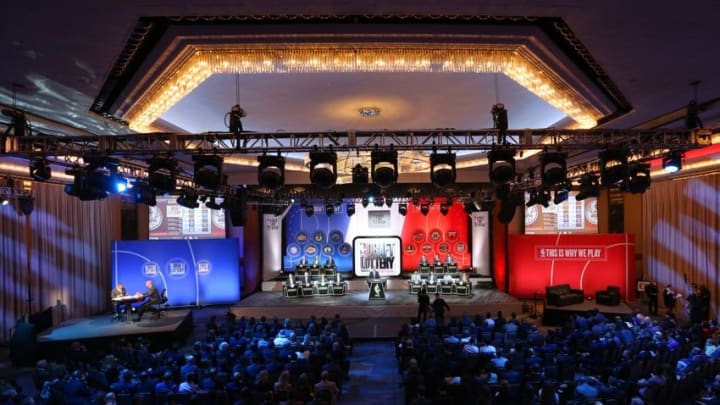Mental Training, Evaluations, and the NBA Draft
By Ed Isaacson

As NBA teams finalize their draft board’s for this week’s draft, it is the end result of a massive accumulation of information on the players involved. While their play during their college or international careers, as well as their pre-draft workouts, are important, there are a lot of other factors involved in determining who will be the right fit for an organization. Among the information gathered is a mental assessment, which is now becoming common during the process.
Dr. Rainer Meisterjahn is the owner of Courtex Performance LLC, and a Mental Coach. Courtex provides mental training, education, and evaluation services, and Meisterjahn has worked with numerous players and coaches in the NCAA, FIBA, and the NBA, including consulting with the Milwaukee Bucks on mental assessments during the 2013 pre-draft process.
So what exactly does a mental trainer do, and how is understanding a player’s mental make-up valuable to the NBA Draft process?
“Mental training is training from the neck up,” said Meisterjahn. “It’s equipping players with the mental skills to maximize their potential, including building confidence, competiveness, composure, and communication skills. It can give players a greater sense of mindfulness so they are able to recognize their thoughts and emotions in the moment and make more purposeful adjustments on and off the court.”
The evaluation process itself isn’t always easy, but when done correctly, it can get players to open up about their mental make-up. “Evaluating players is all about building rapport with them and establishing an initial relationship,” Meisterjahn explained. “You meet with them one-on-one, and ask them targeted and creative questions to gain insight into their level of self-awareness and attitude on topics ranging from leadership to lifestyle management.”
The setting itself can vary, and mental training can take on different shapes and forms. It can be used to address specific problems, such as a lack of confidence at the free throw line, or it can help players further elevate their current mental strengths. “Mental training is used not only to assist players who are struggling, but for players to gain percentage points in all areas,” said Meisterjahn. “I basically look at myself as an athletic trainer AND a strength coach for the mind.”
More from Hoops Habit
- 7 Players the Miami Heat might replace Herro with by the trade deadline
- Meet Cooper Flagg: The best American prospect since LeBron James
- Are the Miami Heat laying the groundwork for their next super team?
- Sophomore Jump: 5 second-year NBA players bound to breakout
- NBA Trades: The Lakers bolster their frontcourt in this deal with the Pacers
As for the process itself, there is no set endpoint, as it depends on the player, but the benefits can extend far beyond the training sessions. As Meisterjahn explained, “mental training is a life-long process. You need to consistently train to optimize your potential.”
During the draft evaluation process, it can be a significant learning tool, not only for the players being evaluated, but for their teams and staff, and it takes a collaborative effort to get the most out of it.
“It starts by getting together with the front office and staff to find out what the core values of the organization are,” said Meisterjahn. “This will drive questions in the interview or training process. For example, if the team looks at ‘unselfishness’ as a core value, questions are designed to elicit authentic answers from players to figure out how they fit that core value.”
Players are often coached on how to answer certain questions posed to them during the process, so getting them away from that and finding ways to get ‘real’ responses out of them is a challenge. But, it’s not all about “right” or “wrong” answers, and more about gaining insight into a player’s mental processes. “You are looking for players who are self-aware, not perfect,” Meisterjahn explained.
The process is not necessarily an easy one, and the professionals doing the evaluation have some barriers to get through. “In these kind of settings, you have to build a rapport and trust in a limited amount of time.”
The insight and answers Meisterjohn is looking for can also come from things outside of the one-on-one setting. “There is also a tremendous value in observing the players work out,” Meisterjahn said. “While watching them, you can learn how players manage controllable factors on the court, like their energy, body language, and how they engage with teammates.”
Once Meisterjahn has concluded his assessment, he then needs to communicate the results to the team’s front office, especially in a way that is easily digestible and informative for them , which can take multiple forms. “With your reports on the players, you can give the team results of any quantitative testing, plus provide them the results of your interview assessment and observations,” Meisterjahn said. “It can take the form of a report detailing mental strengths and areas where a player needs to improve, as well as noting how the player fits with the core values. Also, if there is a player who may be a risk or has specific or unusual needs, detailing what resources need to be available to help that player succeed.”
With all money and time invested on draft picks, and their importance in the building of winning franchises, having as much information as possible on the players, and their potential fit, becomes extremely important, and more and more teams are investing in sport psychology consultants or mental coaches, as well as team psychologists. The benefits are evident for the teams and the players in today’s NBA where comprehensive player evaluation and development are a necessity for any organization that wants remain competitive.
You can learn more about Courtex Performance LLC on their website, and you can follow them on Twitter. Dr. Meisterjahn can be reached directly at rainer@courtexperform.com.
Leave your comments below, or email me – ed@nbadraftblog.com
Follow me on Twitter – @NBADraftBlog